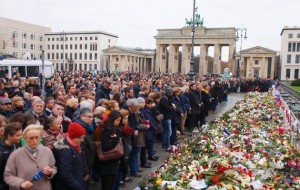“It’s quieter than normal, especially in the areas close to where the attacks took place. People are subdued, they are very serious,” former head of the Journalism department at Rhodes University Guy Berger told News24.
Paris is known for its street culture, where people are often out and about in public areas at all hours. Despite the attacks on Friday, people were determined not to let fear dictate their movement, Berger said.
“They are defiant – not scared. There is a lot of anger and defiance.”

Berger is currently the director at the Freedom of Expression and Media development at Unesco based in Paris. He has lived in the city for the past four years.
He was at the iconic Eiffel Tower on Friday night when teams of men with guns and suicide vests carried out co-ordinated attacks across the city. He found about it on Twitter.
“We were about 10km from the nearest [attack]. Where I was it was very peaceful, there were no security people.”
Three teams of men armed with guns and suicide vests carried out simultaneous attacks at some of the French capital’s most popular night-spots, including a sold-out concert hall, at restaurants and bars and outside France’s national stadium.
It was the second terrorist strike in less than 10 months. In January, 17 people were killed in jihadist gun attacks, five of them cartoonists at the satirical magazine Charlie Hebdo.
Berger said Parisians were still trying to digest what happened.
Unlike an earlier attack in the city this year which targeted satirical magazine Charlie Hebdo for its controversial depictions of Prophet Mohammed in its publication, the latest attacks were targeted at ordinary people.
“This is a much wider thing than the Charlie Hebdo attack. It catches everyone… the sheer magnitude [of the attacks].
“Usually people in Paris try to enjoy themselves because it is such a beautiful [city]. The mood is very sombre. People are trying to deal with it.”
The Islamic State group claimed responsibility for the attacks.
Berger described the group as “extremely socially conservative”.
“Their ideas are very different to what the modern world regards as social norms. In the modern world there is tolerance… you don’t go and kill people.”
While visiting a park on Sunday morning, Berger said he got the sense that people would not let the attacks change their way of life. Movie houses had reopened, churches were holding their services and some families were still coming to the public areas like the park.
“There is normally a lot of kids but there’s about a third of them are here today. But life is getting back to normal. The sun is shining, it’s a beautiful day out here. People are resilient and there is a lot of tradition, people like to sit on pavements and drink their coffee or wine.”
After the attack on Charlie Hebdo, France had increased security outside schools and shopping areas. Media houses had also set up their own security systems, Berger said.
“The thing about Paris is there is a lot of street life. You can’t put security in every [part of it]. You can’t really protect everything, you got to pre-empt [such events]…stop them beforehand.”
Meanwhile, the whole world, including South Africa, is at risk of terrorist attacks, a senior researcher from the Institute for Security Studies said.
“The Islamic State declaring its intention to attack western interests in any part of the world makes any country, including South Africa… vulnerable,” Martin Ewi told News24.
There were a number of western interests in South Africa and in Africa as a whole.
“There could be an attack [in South Africa] because we harbour elements that are incompatible with these Islamic groups.”
However the country had good policies which minimised the threat and made sure South Africa did not infuriate Muslims or isolate the Muslim community, Ewi said.
He said security measures would help deter an attack. “If security measures are not effective [terrorists] can take advantage.”
Security wasn’t the only factor, however. He warned that a country could also be at risk if a neighbouring state was not secure.
State security spokesperson Brain Dube could not be reached for comment on South Africa’s readiness for a potential attack.
Ewi compared terrorism to crime. People could put up electric fences, high walls and alarms but this did not stop criminals.
“The same with terrorism. We won’t be able to completely deter it.”
A terrorist attack did not happen overnight and a lot of time and planning went into them.
“Terrorists have all the time on their hands. You will never know that you going to be attacked the next day. No one in France knew terrorists were going to attack on Friday night.”
Ewi said he wanted to believe that South Africa’s state security was doing everything possible to protect the country and its citizens.
He referred to a warning issued by the United States in September.
At the time the US embassy said its Diplomatic Mission to South Africa had received information that extremists may be targeting its interests in the country “to possibly include US Government facilities and other facilities identifiable with US business interests”.
“Things will only get exposed if for some reason we face an attack in this country,” said Ewi.
“So far we can say they [state security] are doing a good job. We had numerous warnings… and nothing has happened.”
Additional reporting: Sydney Morweng, News Editor
